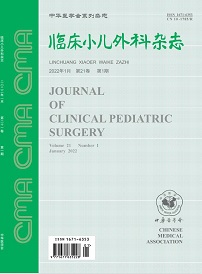XING Li li,WU Ye ming,ZHANG Chi..Ursolic acid effects proliferation、apoptosis and MYCN expression of neuroblastoma cell[J].Journal of Clinical Pediatric Surgery,,12():196-200.[doi:10.3969/j.issn.1671—6353.2013.03.010]
Ursolic acid effects proliferation、apoptosis and MYCN expression of neuroblastoma cell
- Keywords:
- Neuroblastoma; Ursolic acid; Cell proliferation; Cell apoptosis; MYCN
- Abstract:
- Objetive This study was designed to investigate the effects of ursolic acid in proliferation、apoptosis and MYCN gene mRNA expression of SHSY5Y cell line cultured in vitro, in order to investigate the effect of ursolic acid (UA) in neuroblastoma(NB).MethodNeuroblastoma SHSY5Y cells were treated by 4 uM/L、8 uM/L、12 uM/L ursolic acid.WST1 was used to measure the levels of the proliferation of SHSY5Ycells cultured with different concentrations of ursolic acid. While SHSY5Ycells apoptosis was measured by flow cytometry. MYCN gene mRNA expression in SHSY5Yceils was measured using real time PCR.ResultsThe proliferation of SHSY5Ycells was obviously inhibited by ursolic acid in a doseand timedependent manner. The apoptosis of SHSY5Ycells was obviously promoted by ursolic acid in a dosedependent manner. The MYCN gene mRNA expression in SHSY5Ycells was obviously inhibited by ursolic acid in a doseependent manner. Ursolic acid of 12uM/L treatment for 72 hrs produced a best effect with an inhibitory rate of SHSY5Y cell proliferation of 98.3 % and inhibitory rate of MYCN gene mRNA expression of 52.37%. ConclusionsUrsolic acid may inhibit the growth of neuroblastoma cells, promote neuroblastoma cells apoptosis and downregulate MYCN mRNA expression.
References:
1Maris JM, Matthay KK. Molecular biology of neuroblastoma[J]. J.Clin.Oncol,1999:2264—2279.
2Anderson J, Gibson S, Williamson D, et al. Rapid and accurate determination of MYCN copy number and 1p deletion in neuroblastoma by quantitative PCR[J]. Pediatr Blood Cancer, 2006, 46:820—824.
3Moreau LA, McGrady P, London WB, et a1. Does MYCN amplification manifested as homogeneously staining regions at diagnosis predict a worse outcome in children with neuroblastoma? A Children’s Oncology Group Study[J]. Clin Cancer Res, 2006, 12:5693-5697.
4Yu Y X, Gu Z L, Yin J L, et al. Ursolic acid induces human hepatoma cell line SMMC7721 apoptosis via p53dependent pathway\[J\]. Clin Med J(Engl),2010, 123(14):1915—1923.
5Huang CY, Lin CY, Tsai CW, et al. Inhibition of cell proliferation, invasion and migration by ursolic acid in human lung cancer cell lines[J]. Toxicol In Vitro, 2011,25(7):1274—1280.
6Liu J. Oleanolic acid and ursolic acid:research perspectives[J]. J Ethnopharmacol, 2005, 100(1—2):92—94.
7Kassi E, Sourlingas TG. Ursolic acid triggers apoptosis and bcl2 downregulation in MCF7 breast cancer cells[J]. Cancer Invest, 2009, 27:723—733.
8Gu G, Barone I, Gelsomino L, et al. Oldenlandia diffusa extracts exert antiproliferative and apoptotic effects on human breast cancer cells through ERα/Sp1mediated p53 activation[J]. J Cell Physiol, 2012,227(10):3363—3372.
9Mooi LY, Yew WT, Hsum YW, et al. Suppressive effect of maslinic acid on PMAinduced protein kinase C in human Blymphoblastoid cells[J]. Asian Pac J Cancer Prev, 2012,13(4):1177—1182.
10Song YH, Jeong SJ, Kwon HY, et al.Ursolic acid from Oldenlandia diffusa induces apoptosis via activation of caspases and phosphorylation of glycogen synthase kinase 3 beta in SKOV3 ovarian cancer cells[J]. Biol Pharm Bull, 2012, 35(7):1022—1028.
11Kohl NE, Kanda N, Schreck RR, et al. Transposition and amplification of oncogenerelated sequences in human neuroblastomas[J]. Cell, 1983, 35:359—367.
12Eilers M, Eisenman RN. Myc’s broad reach[J]. Genes Dev, 2008, 22:2755—66.
13Natsumi Tanaka, Masahiro Fukuzawa. MYCN downregulates integrin α1 to promote invasion of human neuroblastoma cells[J]. Int J Oncol, 2008, 33(4):815—821.
14Yeh CT, Wu CH, Yen GC. Ursolic acid, a naturally occurring triterpenoid, suppresses migration and invasion of human breast cancer cells by modulating cJun Nterminal kinase, Akt and mammalian target of rapamycin signaling[J]. Mol Nutr Food Res, 2010, 54(9):1285—1295.
15Gao X, Deeb D, Jiang H, et al. Synthetic triterpenoids inhibit growth and induce apoptosis in human glioblastoma and neuroblastoma cells through inhibition of prosurvival Akt, NFkappaB and Notch1 signaling[J]. J Neurooncol, 2007, 84(2):147—157.
